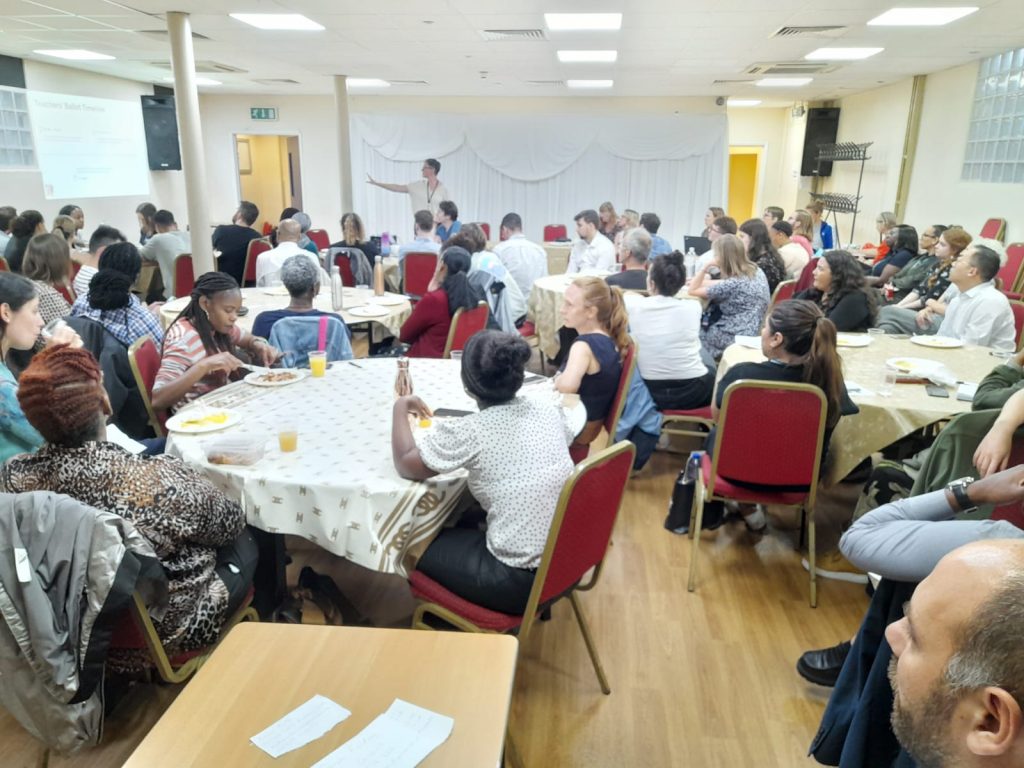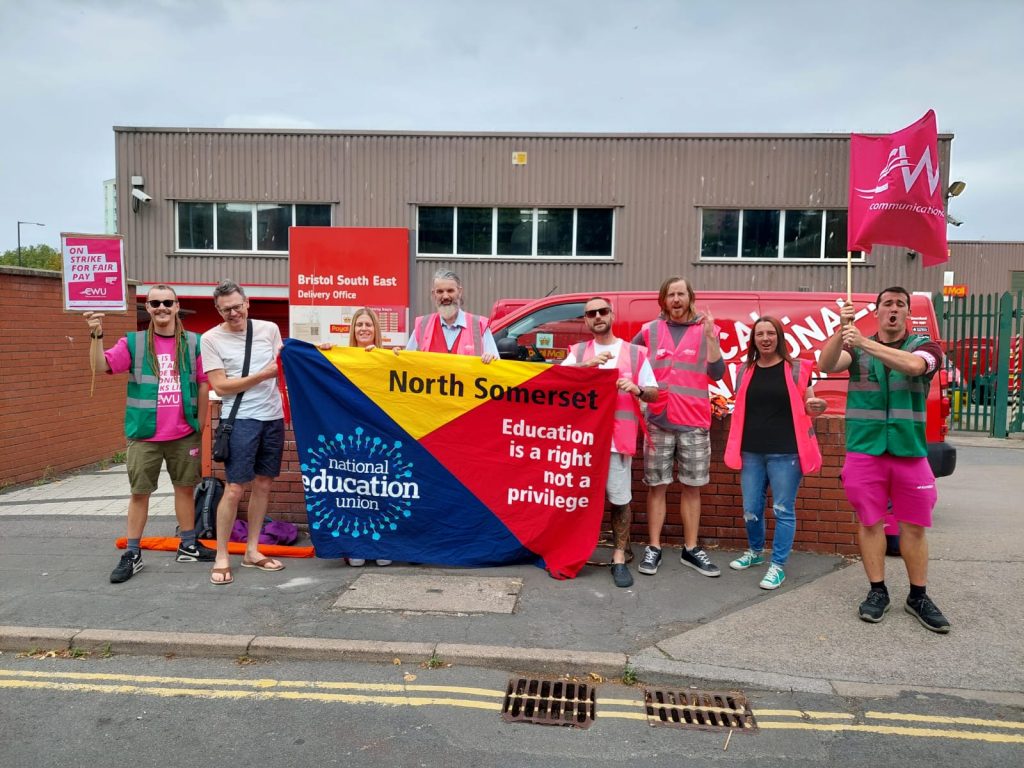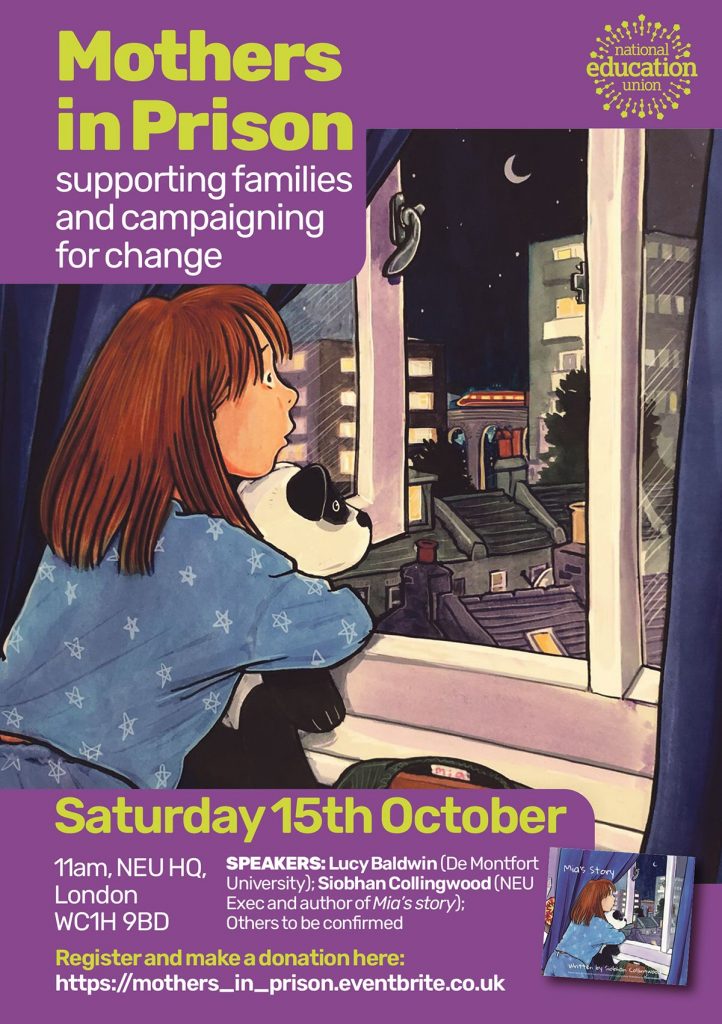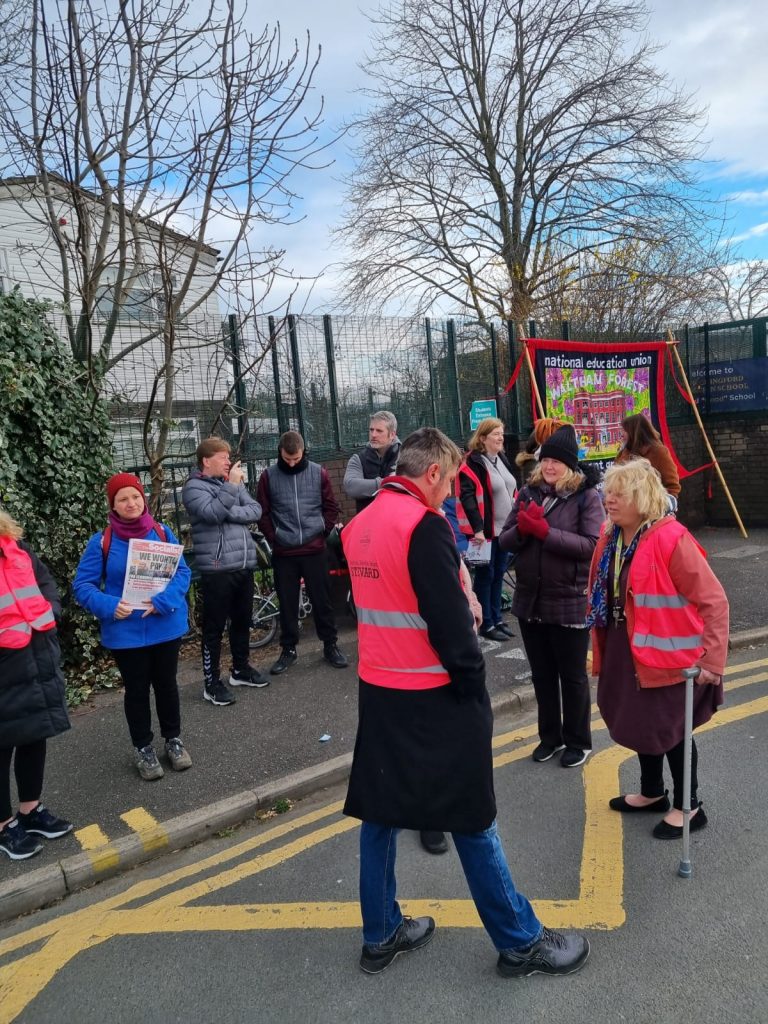
All out to win pay ballots
The NEU’s internal ballot on teachers’ pay gets underway on Saturday 24th September- when members should get their email link to vote.
Already some districts have had excellent pay briefings. Many, many more are happening this week.
Support staff members have already started their consultation ballot on pay, as have sixth form college members.
In the next days and weeks winning these ballots with the largest possible turnout has to be the number one priority for every NEU activist.
We then need to move to full strike ballots as quickly as possible, so we can pile the pressure on the government with hard hitting strike action and win the pay rise and funding for it we all deserve and need.
Getting members and reps to pay briefings is a crucial first step- all the data says that where that happens the turn out is highest.
So where possible phone and talk to reps and connect up with them. Use the union’s materials to push for school meetings to carry the arguments for a fight down into as many schools as possible.
If you help run a district make sure reps have lists of members to go round and check they have voted- encourage them to involve others in their schools in this work too.
Push for districts to have a targeted strategy- look at the schools where the bulk of the membership is concentrated – use the NEU pay dashboard to hep with this. Focus on getting meetings in these schools and driving up the turn out to push past government thresholds.
In schools with no rep see if you can persuade someone to be one or at least some people to become ballot organisers. This internal ballot will be followed by a full postal strike ballot so building organisation is crucial to win that with the turn out needed too.
If you are in a less organised district or don’t help run the district, then start with making sure the turn out is high in your own school. But then reach out- offer to help the district officers with phoning reps and members in other schools, contact people in nearby schools directly and encourage them too.
Every connection, every step to developing and deepening organisation will help – not just in this internal ballot but in the postal strike ballot that will follow.
Use your local NEU Left network to discuss the pay campaign, what works and what does not and to support each other in driving up the turn out.
SEND REPORTS, STORIES and PICTURES to [email protected] and we will include them in future bulletins
If you agree with the arguments in this bulletin why not join the NEU Left? Go to the Join us page on this website.
Unite the fights on Saturday 1 October

All workers face the same pressures on pay, jobs and funding. And more are now fighting back and striking. Linking up and uniting the fights can strengthen us all.
On Saturday 1 October there is a huge chance to do that.
The CWU postal workers’ union has called a national strike in Royal Mail on the same day as the RMT, ASLEF and TSSA unions have called more rail strikes.
Alongside this dockers at Felixstowe and Liverpool – ports which handle 60 percent if Britain’s container traffic- are beginning sustained strike action too. And now hundreds of thousands of nurses in the Royal College of Nursing have been told by their union that they will be balloting next month on strikes as well.
The Enough is Enough campaign- which has held huge rallies across the county and seen 600,000 people sign up has called protests on 1 October in 13 cities.
They are London, Birmingham. Manchester, Liverpool. Glasgow, Leeds, Cardiff, Newcastle, Hull, Norwich, Nottingham, Portsmouth and Plymouth.
We should organise to get NEU banners and members from districts and schools onto these and help turn them into united shows of working class resistance to the cost of living crisis.
If no rally has yet been called in your town or city yet then take the initiative- contact others in the local movement and get one set up- there should be no significant town or city without a protest that day.
That solidarity and unity can help fuel the mood everywhere, boost the turn out in our own ballot and feed the confidence that we can all fight and win.
Scotland shows the way
Teachers in the EIS union in Scotland have voted massively for a fight on pay in an internal union ballot.
The 60,000 strong EIS is the main teachers union in Scotland and its members voted by 91 percent on a 78 percent turnout to reject a 5 percent pay offer – ie a 7 percent real terms pay cut- and for a strike to win a better pay deal.
The union has now said it will move to a formal strike ballot.
Let’s organise to make sure our union- with our 460,000 members is not far behind!

Mothers in Prison conference
By Siobhan Colligwood
This conference aims to shine a light on the broken criminal justice response to women and families. A culture of shame and blame, makes many of us reluctant to engage with the issues faced by children affected and with their mother in prison.
Each year 17,000 children are separated from their mother due to maternal incarceration. No help is available, no agencies are responsible and schools often don’t know what they are going through.
Most of these children have to leave home, have fractured family relationships and if they do get to visit their Mum have to travel an average of 65 miles to get there. Nobody explains what is happening: little surprise then, that many experience mental health problems and enter the criminal justice system themselves.
Why is this considered necessary – how much of a risk do women in prison pose to the wider society? Most of the women in prison are non-violent, with more harm inflicted upon them than by them. 67% of women are in prison for non-violent reasons. Women in prison are twice as likely to have experienced domestic abuse and nearly seven times more likely to self harm.
Many of the problems that have contributed to their path to prison, are exacerbated following a prison sentence – 20% are homeless before entering prison increasing by a further 30% on release, 40% are unemployed before entering increasing by a further 35% on release.
It is now proposed to increase female prison numbers by 500 costing £26 million. Every £1 spent on this programme could save £2.84 by investing in holistic community based responses.
In Conclusion, largely traumatised non-violent women are sent to prison, they and their families are stigmatised and damaged.
The problems faced before entering prison are made worse not better, and it costs nearly three times more to punish rather than heal.
Why are we not applying trauma informed principles to those in need of assistance? Why would we not seek to fix broken people and families?
Perhaps if we did, we would not only make life better for individuals, but would start to fix apparently unassailable societal ills that affect all of us. This conference aims to encourage professionals to work together to make a difference.
Forest Fight lessons

In the NEU Educate magazine recently, there was an article about wins by school groups in Waltham Forest, London. We spoke to Sandra Faria and Pablo Phillips joint district secretaries.
The title of the Educate piece was “our members are fed up with being taken for granted”. Can you tell us why this is and what the mood has been like in Waltham Forest?
Sandra
Our members worked very hard through the pandemic, having to adapt to very different working conditions with minimal support to achieve astonishing levels of engagement from young people and their families. This year many of them returned to work after the summer holidays to face underfunded schools where more was being asked from them for less or the same pay. Many came back to see their jobs or pensions at risk. They faced the choice of accepting this or understanding that they couldn’t carry on being pulled into low levels of morale and job insecurity.
We pay inner London rents, inner London mortgages and inner London childcare rates. We are paid outer London wages. Many of us have been loyal workers, staying in Waltham Forest for years because we believed in the value of our work here. Those experienced staff were at the forefront of many of these attacks on their working conditions and they couldn’t just accept that this is the way they should be treated.
There have been a flurry of strikes in Waltham Forest this year. How did it all start?
Sandra
Six women members, part of the support staff body at Salisbury Manor, decided that they weren’t going to accept changes in contract that were discriminatory, after their views were completely ignored during consultation. They took a stand and won. Then, members at a private school, Forest School, were told they would be taken out of the Teachers’ Pension scheme, so they also took a stand. From then on, as threats of restructures and detriments to working conditions for members started coming in, members felt encouraged to stand up for each other.
Pablo
I think the key thing was the Salisbury Manor dispute. I think one of the things about it was that it was the anger that these women expressed. They felt really angry. It was quite electrifying being in a meeting with them. And that was the same feeling at Forest school.
Forest school was an Independent school which took strike action. To many this seems a bit surprising. What was the issue and what did the strikes achieve?
Sandra
Well it is if you think that educators are somehow different from one workplace to another but they are not. Teachers’ pensions being attacked are not any different in a private school.
Pablo
And also those teachers not only fought for themselves, it was also for others. So they kept themselves in the TPS, got agreement that new joiners could join. After 4 strike days they also won a 5% pay rise which wasn’t even part of the dispute!
There were also strikes at South Chingford, Walthamstow Academy and cleaners struck at Connaught school for girls. What have been the main issues driving these strikes?
Sandra
Redundancies, workload and support staff terms and conditions. In the case of South Chingford the issues were about attacks on the PE staff as well as workload issues.
Pablo
Walthamstow primary members had just had enough. They made a list of demands,49 of them. They ended up getting 48 agreed. It was cleaners who were being TUPEd which was the basis of the dispute and again its support staff leading the way. The pickets at WPA and South Chingford were amazing. They had breakfast for students and bubble blowing. Struggle makes you creative.
How do you think those strikes affected other school groups in Waltham Forest?
Sandra
Every strike that happened in Waltham Forest emboldened members across the district to make their voices heard when school leaders ignored them or pushed their concerns aside. It also made school leaders aware of the power of the union and in many other cases this was enough to allow proper negotiations, not just consultations, to take place.
Pablo
As Sandra said, it emboldened members. It was like a norm to ballot. Connaught members balloted twice after the cleaners were balloted. You know, it became like a strike news update every week. Emails to all members about the latest ballot or dispute.
How have reps and reps committees developed during this year in Waltham Forest? Are they more confident?
Sandra
Rep committees help bring about confidence for reps and for union groups in general. It is easier to put arguments together as a cohesive committee on behalf of a wider group than as a single rep. In schools with single reps, there is still plenty of dialogue across school groups that helps reps find news ways to negotiate with leadership.
Pablo
I remember Sandra developed this during Covid. It made sense and has grown. It can create a new layer of leaders. And of course the strikes and ballots throw up new reps and reps committees in places they had not existed before. If you want a sign of confidence, we had reps training in the first week of July. Both me and Sandra were ill and couldn’t attend and yet the day was a total success cos the reps organised and ran the day themselves.
Looking to the pay ballot, what are members saying?
Sandra
Members want fair pay and they know the ballot is our only meaningful negotiation tool. There is absolute enthusiasm for the pay ballot across union groups.
Pablo
We are hoping the confidence and spirit will spill over into a positive turnout. I think members this year have given themselves a fighting chance to win a ballot.
Finally, Have you got any tips for other districts in terms of winning a successful pay ballot?
Sandra
Be flexible, some members and reps can and will attend meetings, others will respond to emails or texts, others will prefer to be approached in person in school. Our membership is diverse, so our approach needs to be diversified as well.
Pablo
Try and make it an enjoyable and fun time. Do group selfies, go out and have a meal with the group, do a phonebank evening and order pizzas. And as Sandra said, be flexible. Being formulaic is a disaster.


